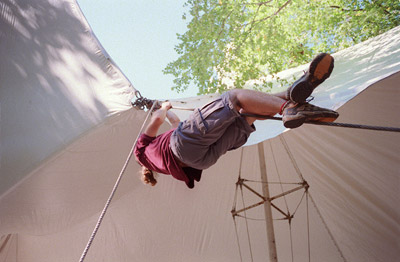Inauguration prep in full swing
Fete will be held in time-honored tradition

Harvard’s modern-day president will meet time-honored tradition on stage at Tercentenary Theatre on Oct. 12 as Lawrence H. Summers takes part in the centuries-old ceremony installing him as president.
Preparations for the ceremony continued this week, moving into the final stage. E-mail invitations went out to graduate students; follow-up calls confirmed reservations to ticketed events, freeing extra spots for the general University community; and dozens of other last-minute preparations were finalized.
“Organizing an inauguration is a substantial effort involving the hard work of many dedicated individuals who have been meeting and planning behind the scenes since the spring,” said Inaugural Coordinator Jacqueline O’Neill. “We are especially pleased that the Installation will be held outdoors in the same location as Commencement so that all members of our community will be able to attend.”
University Marshal Richard Hunt said the Holyoke Chair and symbolic signs of the President’s Office will be moved from the Fogg Art Museum to the stage for the ceremony.
Unlike a public official who swears an oath on their inauguration, Summers won’t be sworn in. He will be installed after the Board of Overseers President Richard E. Oldenburg and Senior Fellow of Harvard College Robert Stone present him with badges of authority and a copy of the University’s original charter. The “badges” include two foot-long silver keys, which represent keys to the doors of knowledge, and two Harvard seals dating from 1650 and 1885.
After the presentation, Summers will move from the chair he occupies for the first part of the ceremony into the Holyoke Chair.
“The solemn moment is when the charge and presentation are made,” Hunt said. “With that happening and with the president moving to the Holyoke Chair, that signifies the Installation is complete.”
Summers has, of course, been serving as Harvard’s president since July 1. Again, unlike the case of a public servant, who may serve in an “acting” capacity before their swearing-in, Summers has had the full powers of his office even before the Installation.
While the day’s main events will be the Installation and Summers’ speech to the University community, tradition, while largely ceremonial, plays an important role.
“Tradition is not just dusty relics handed down from the past, but an inherited culture,” Hunt said. “Harvard’s excellence didn’t just happen today, it is built on centuries of work and tradition by Harvard students, faculty, and staff. It is on this work and tradition that Harvard’s president will build for the future.”
The inaugural ceremony will kick off with an academic procession, including Harvard faculty and representatives from 150 other institutions and learned societies. Among the representatives will be Yale President Richard Levin, who will speak during the installation ceremony. Other speakers during the ceremony will be the president of the Undergraduate Council, senior Paul Gusmorino, and president of the Harvard Alumni Association, Karen Spencer Kelly.
Leading the academic procession will be the master of Cambridge University’s Emmanuel College, Professor J.E. Ffowcs Williams. Established in 1584, Emmanuel, the alma mater of John Harvard, will be the oldest institution represented in the procession.
“There has always been an intimate connection between Emmanuel College and Harvard,” said the Rev. Professor Peter J. Gomes, Plummer Professor of Christian Morals and Pusey Minister in the Memorial Church. “The master of Emmanuel is usually represented at Harvard [installations]. This time the master of Emmanuel will be the senior foreign representative.”
Gomes said there will be an extended morning prayer service on Friday, Oct. 12, the morning of the Installation. At that service, Williams will be the principal speaker, bringing the official greetings of Cambridge University, Gomes said.
In addition to tradition and ceremony, academics are an important part of the day. The six symposia scheduled for the morning before the installation ceremony are intended to explore a broad range of academic areas and address complex modern issues.
The symposia, which are open only to ticket holders, will cover topics ranging from brain science to art and mass culture to ethics in a market economy.
“The idea wasn’t to be comprehensive, but rather to identify topics that are timely and identify topics on which Harvard faculty have something important to say,” said Assistant Provost for Interfaculty Programs Sean Buffington.
Though Harvard faculty figure prominently in the symposia, Buffington said several experts from other institutions will be on the panels.
“The most important aspect of the Installation is to give President Summers a chance to speak to the Harvard community, to lay out his vision,” Buffington said. “The second most important is the symbolic aspect that at the heart of the convocation is an academic event such as the symposia.”




